Little Free Libraries aim to have a big impact in school book ban-barraged Florida
TALLAHASSEE — Toni Morrison's "The Bluest Eye" sat one book away from Ibram X. Kendi's "Antiracist Baby."
But it wouldn't for long. Titles in Heather Encinosa's Little Free Library clear out fast.
Those two books sharing a spot in the little display box isn't their only similarity. "The Bluest Eye," which delves into topics like racial identity and beauty standards, and "Antiracist Baby," a children's book that discusses racism and how to fight it, have both been targeted and even removed from some school shelves in Florida and across the country.
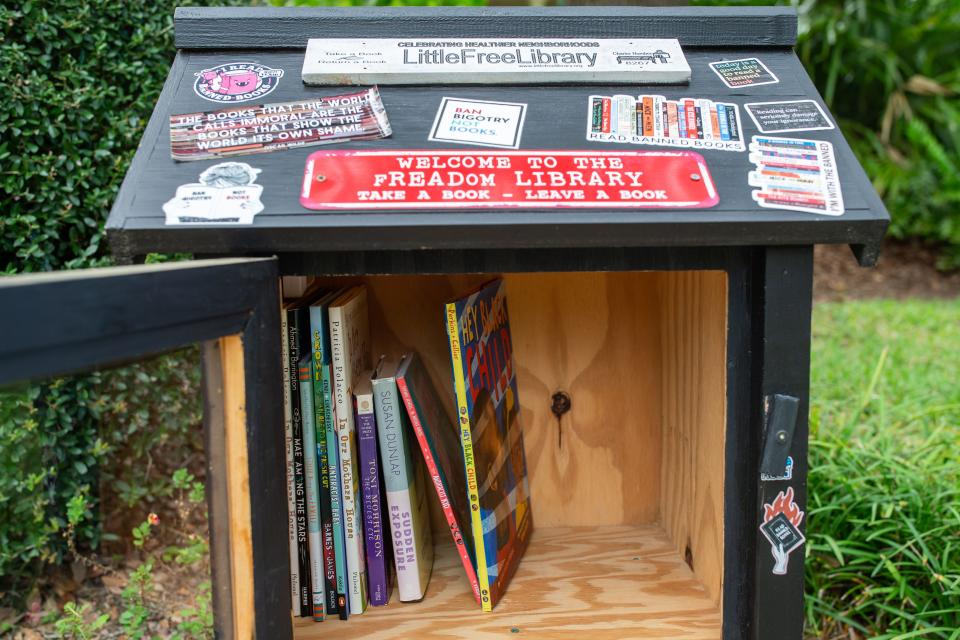
The box, painted black, stands in front of Encinosa's Tallahassee home. It's covered in stickers. "READ BANNED BOOKS," several of the multitude say. "BAN BIGOTRY NOT BOOKS," another shouts. They surround a pun, etched in bold white letters on a red sign, "WELCOME TO THE FREADOM LIBRARY."
Only a couple miles away soars the Capitol, where Republican lawmakers have produced bills that have contributed to the state's book removal surge in schools. Florida is No.1 in book banning, according to a recent PEN America report. Even closer to the box is the governor's mansion, where DeSantis, who has pushed for and signed the bills into law, lives when he's not on the presidential campaign trail.
But all that hasn't decreased the appetite for the targeted books. If anything, it's elevated it. That's the case with Encinosa's library, which features books currently and historically targeted in the United States.
A couple of people have taken issue with the library. One woman once packed it with Bibles. But Encinosa, an attorney and mother of two teens, said most people think "it's a valuable part of our neighborhood."
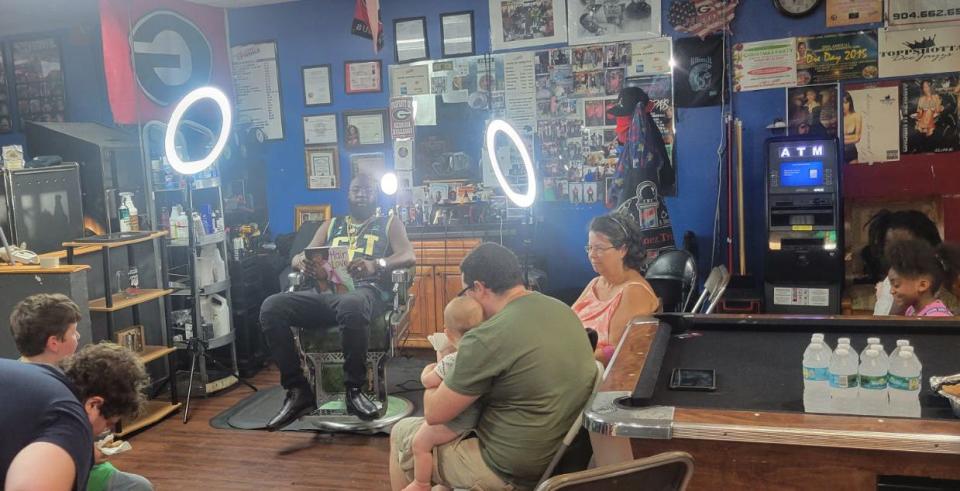
"I just think maybe people don't want to be told what to read," said Encinosa, noting its popularity.
She isn't the only Floridian with the idea. Little Free Libraries featuring banned books can be found throughout the state, and in increasing numbers.
Little libraries popping up statewide
They've appeared in the Jacksonville area, including in front of Cedrick Turner's barbershop.
“I think this can all help people to come in and want to know more,” said Turner, who owns Cutz-Linez & Trimz.
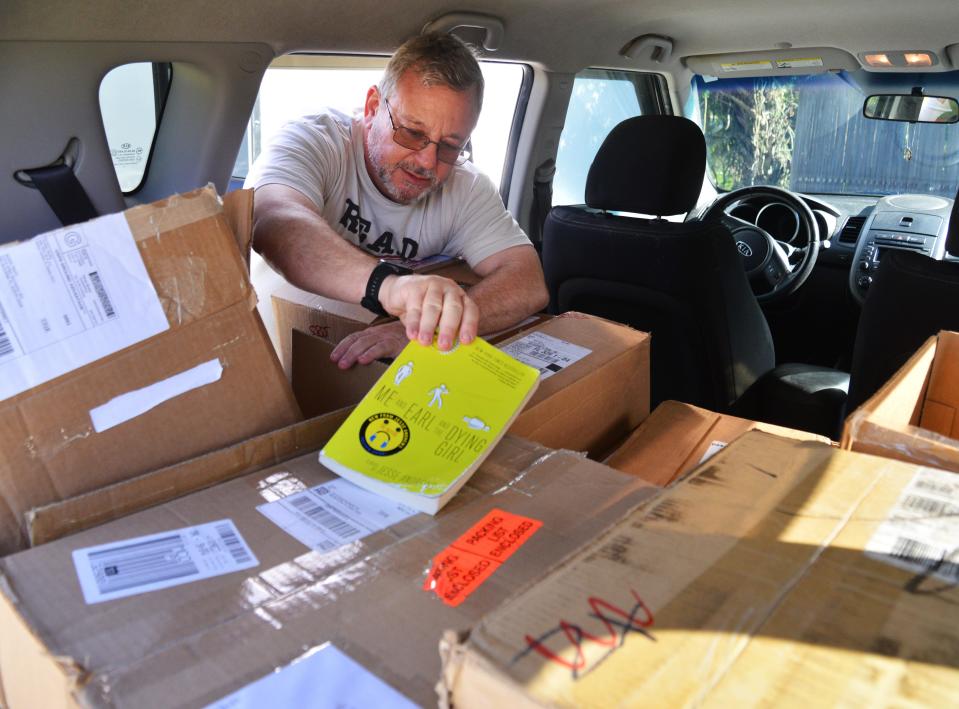
They've popped up in St. Petersburg, in Miami and more.
Adam Tritt and his organization, Foundation 451 — which is named after "Fahrenheit 451" — has led an effort to create a number in Brevard County and elsewhere.
"There's been no lack of donations," said Tritt, a high school English teacher. "People support this. People don't like book banning... The libraries are incredibly popular."
That effort has led to the creation of six Little Free Libraries already, placed in front of churches and homes. Tritt hopes to double that number in coming months. There are also five more teenage safe spaces with banned book libraries, including one in a Melbourne Ben and Jerry's ice cream store.
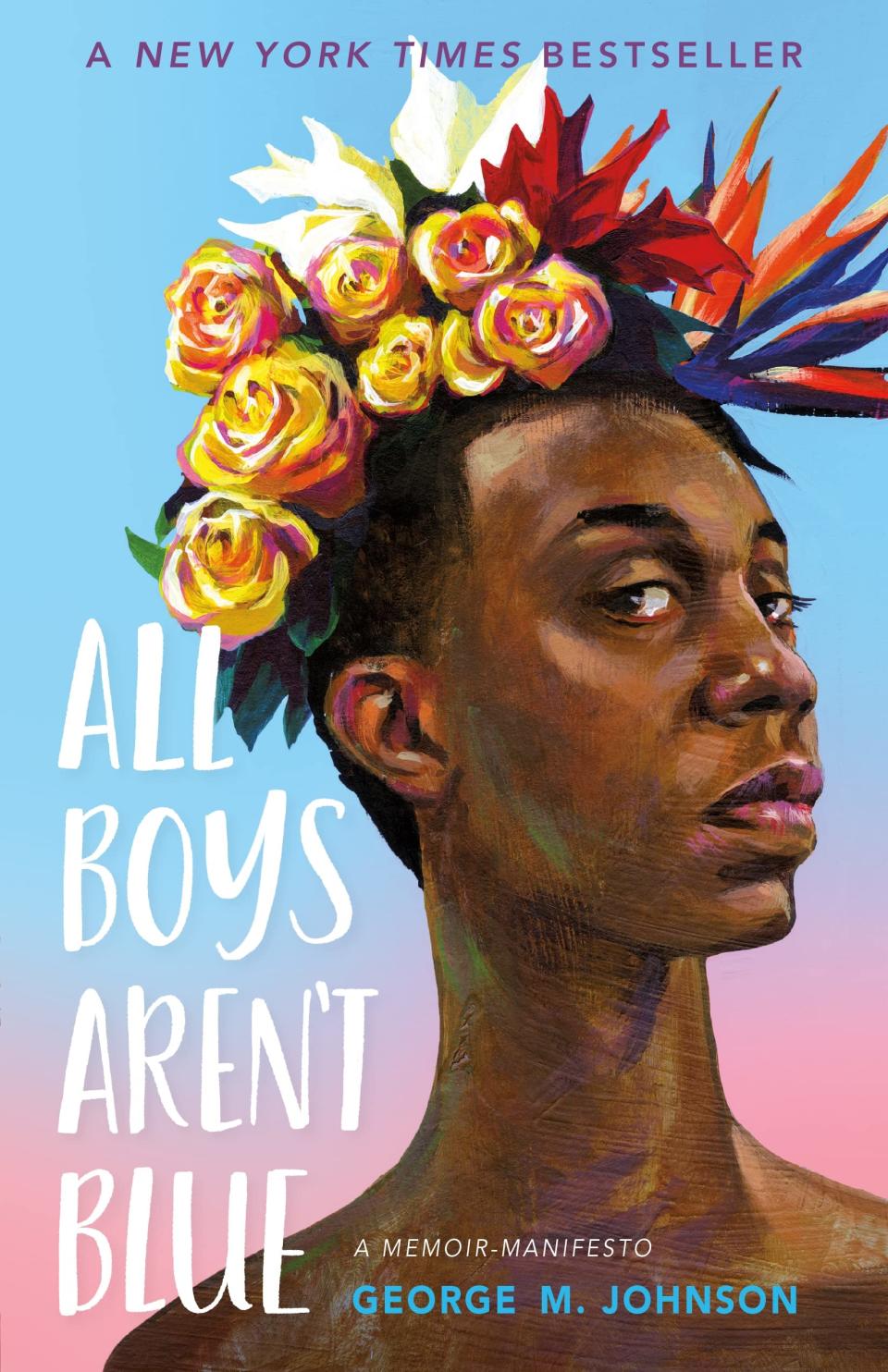
"It's important for a gay kid to read 'All Boys aren't Blue.' They know that they're not alone," he said. The book, which has been targeted and removed across Florida, is a memoir and manifesto by George M. Johnson, who reflects on growing up Black and queer.
"It's just as important for a straight kid to read 'All Boys Aren't Blue,'" he continued. "How similar we are, how small our differences are, how little our differences mean. That's what they are missing. Not having these books keeps us divided."
And it's not just Little Free Libraries spreading attention to books that have been historically and currently targeted. Especially not this October, which began with "Banned Books Week."
The event started in 1982 and is marked by events hosted by libraries, bookstores and book access advocacy organizations across the nation. Many public libraries and bookstores around the state held such events and displays.
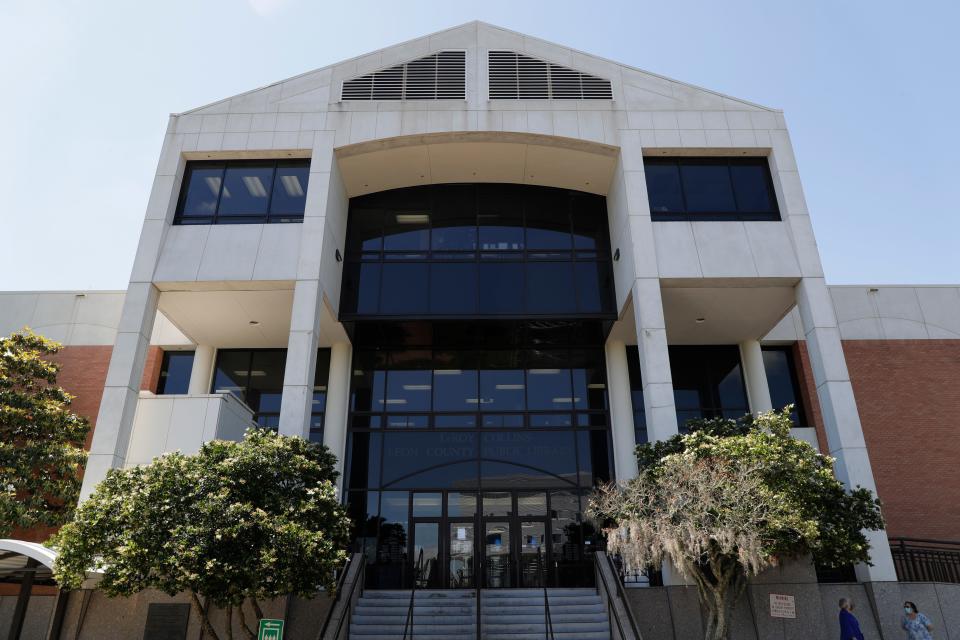
Florida capitol county's public library system, for example, put up several displays, themed "Let Freedom Read" and featuring titles that have been challenged across the nation.
"The beautiful thing about the [theme] is you're free to read whatever you like," said Pamela Monroe, director of the LeRoy Collins Leon County Public Library System. "I would encourage everyone to step outside of your personal box, read something that may challenge your thinking and see what that does for you actually as a person."
In the middle of Banned Books Week, which went from Oct. 1 to Oct. 7, free speech organization PEN America announced that famous authors and millions of dollars are backing a campaign to combat book banning in Florida and beyond.
The organization plans to open up a Florida center before the year's end to "host public events, wage campaigns and empower Florida citizens to defend their basic freedoms."
The Little Free Library organization is an official sponsor of the week. But, even before it, it's worked with community organizations, including in Jacksonville, to increase access to targeted books.
"Book bans go against our core values — especially when the bans overwhelmingly target BIPOC and LGBTQ authors," organization spokesperson Margret Aldrich said in a statement. "We believe everyone should be able to see themselves in the pages of a book. We also know that books can be a window into experiences that are different from our own."
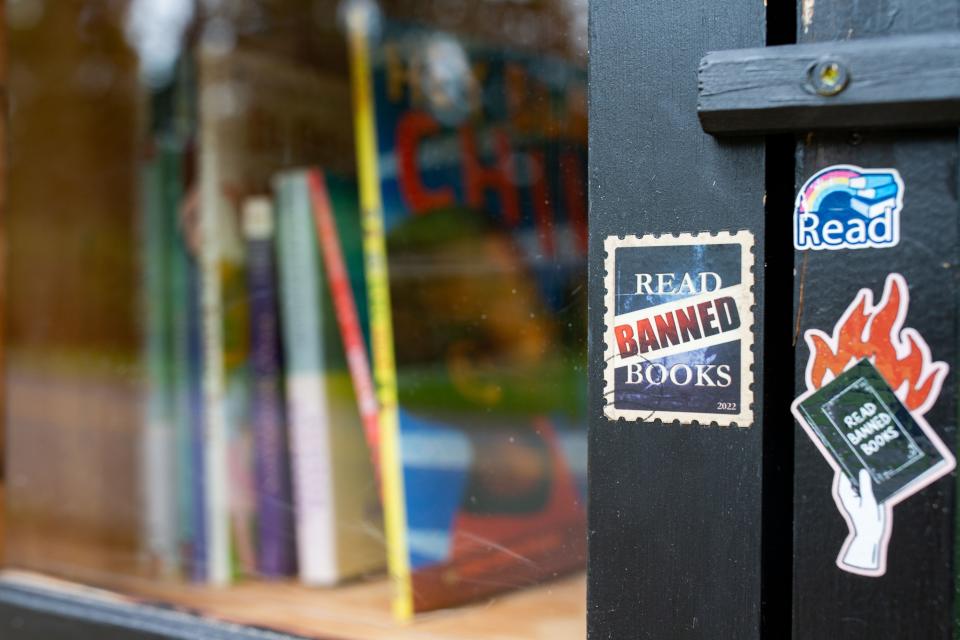
Little free banned libraries: That colorful free book box in your Jacksonville neighborhood may soon offer banned books
'Hundreds and hundreds' of books
School districts across Florida have purged titles from their library shelves since DeSantis signed the Curriculum Transparency Act last year. It came as COVID-19 controversies brought more attention to what was happening in schools, especially from conservative activists and groups like Moms for Liberty.
As local chapters spring up across the state and nation, Moms for Liberty has become one of the leading voices trying to remove “inappropriate” books from schools.
DeSantis touted the law as a way to increase parental involvement in education and prevent "indoctrination." It requires districts to catalog every book they offer and put a formal review process in place for complaints.
Then came House Bill 1069, which took effect July 1, further creating wildly-varying interpretations on what books should be removed from schools — and putting in question even more books. The law requires school districts to remove within five days any book challenged for including pornography or sexual conduct until the complaint is resolved.
Coming into play over the last two years, too, are state laws prohibiting instruction on sexual orientation or gender identity in school. School districts have removed books citing that law, though Florida Attorney General Ashley Moody recently said it doesn't apply to books.
Meanwhile, many teachers who are worried about running afoul of the laws have been clearing their classroom shelves of potentially-controversial titles.
Encinosa wanted to do something to counteract all that. While the current focus on book removals is coming mostly from conservatives, it isn't about politics for her. It's about book access.
"I think if you have tough topics in a book, either personally choose not to read it, or don't let your children read, or, if they do, use it as an opportunity to educate them on that topic," she said. "I think that's the way to handle it."
Encinosa says "hundreds and hundreds" of books, both donated and personally purchased, have been distributed into the community.
"Some people or kids might not have access to books as easily, and if they can't get it from a library for whatever reason, they may not have the means to go to a bookstore or order it from Amazon," Encinosa said. "When I grew up, we weren't rolling in dough by any means, and I think that's an important part of it for me as well."
Banned Books Week 2023: Ways to read challenged books, ebooks for free, even in Florida
Contributed: Florida Times-Union reporter Steve Patterson
This reporting content is supported by a partnership with Freedom Forum and Journalism Funding Partners. USA Today Network-Florida First Amendment reporter Douglas Soule is based in Tallahassee, Fla. He can be reached at DSoule@gannett.com. Twitter: @DouglasSoule.
This article originally appeared on Tallahassee Democrat: 'Little libraries' carry school books removed in DeSantis' Florida

